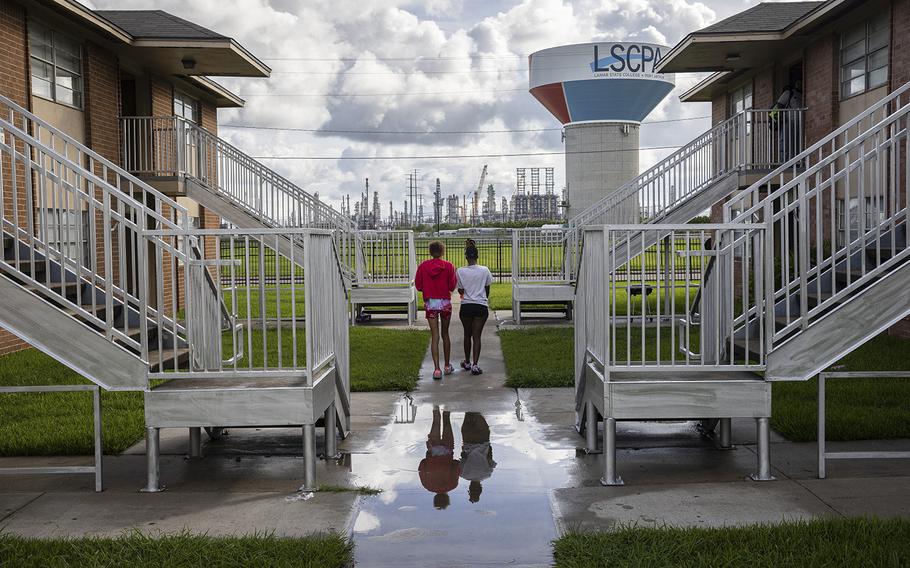
From left, Brandy Smith and Ariel Watson walk through the Prince Hall Village Apartments in Port Arthur, Texas. (Tamir Kalifa for The Washington Post )
PORT ARTHUR, Texas — On any given day at the Prince Hall apartment complex, the breeze might carry soot and stink of burning tar. Black smoke might billow overhead as excess gas is burned at one of the refineries directly across the road. The fumes make Ariel Watson's head ache until she can barely think. Jeremy Roy, 9, closes his windows against air that "stinks like farts."
For the mostly Black and Latino residents of Port Arthur, Texas - home to three oil refineries, two liquid natural gas terminals and at least 40 other facilities that release toxins into the air - the burning of fossil fuels is a local health hazard as well as a planetary threat. But as Democrats celebrate the passage of a hard-fought climate deal, with historic investments in clean energy as well as concessions to the fossil fuel industry, locals fear that the legislation may leave their community behind.
To secure the vote of Sen. Joe Manchin, D-W.Va., party leaders committed to auction off more drilling leases and relax permitting requirements for new projects. Experts say the measures may prolong the environmental damage many Americans now face - especially in areas where petroleum products are produced for export. Now, people in Port Arthur and other industrial communities say they must fight to maintain what power they have left: the ability to comment on - and push back against - polluting infrastructure.
"We're battling for a clean environment, not just for the sake of climate change, but for the sake of the air that we breathe and the water that we drink," said Hilton Kelley, a Port Arthur native and founder of the Community in Power and Development Association, a local environmental justice group. "We're battling for our life."
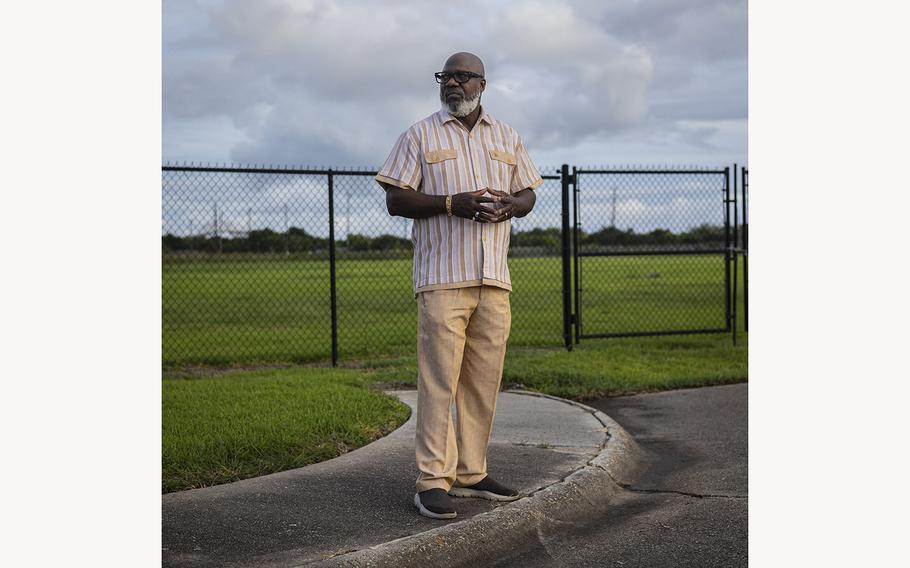
Hilton Kelley, an environmental and community activist at Port Arthur, Texas. (Tamir Kalifa for The Washington Post )
Positioned in the far eastern corner of Texas, close to the Gulf and just 13 miles from where the state's oil was first discovered, Port Arthur has been a hot spot for refining and manufacturing petroleum products for more than a century.
And for just as long, says activist John Beard Jr., the city has been a "sacrifice zone" - one of many low-income communities of color that have borne the cost of the country's economic growth.
Many residents are descended from Black Louisianans who fled the neighboring state's brutal Jim Crow laws - people who could be pressed into the lowest-paid and most dangerous jobs in the industry. Though their salaries enabled them to buy homes and build a vibrant community, discriminatory housing practices confined Black residents to the west side of town, squeezed between the railroad tracks and the refinery fence lines.
There, they breathed air that hasn't always met federal standards for lung-irritating ozone, cancer-causing benzene and other harmful substances. They endured the routine disruptions of flaring, fires and noxious fumes. Hurricanes repeatedly unleashed toxic chemicals, and a 2019 chemical plant explosion forced thousands of people to evacuate their homes. According to filings with the Texas Commission on Environmental Quality, Jefferson County facilities have reported 80 unpermitted chemical releases, known as "emissions events," in the past year.
"It's terrible," said Thomas Hollins, who has had to undergo daily dialysis treatments for nearly a decade. The 70-year-old blames a life of pollution exposure for his illness, and for the deaths of both his parents and three siblings from cancer.
Studies show that cancer risk among Texans rises the closer they get to a refinery. Other research has found that air pollution from oil and gas facilities is associated with chronic kidney disease. The mortality rate from lung cancer in Port Arthur is 29% higher than the state average, according to the Texas cancer registry, and 2019 data from the Centers for Disease Control and Prevention show the proportion of Port Arthur metro area residents reporting chronic kidney disease was 21% higher than the Texas average.
Industry representatives and public officials point to the jobs and tax revenue that refineries create.
"The companies themselves are part of the fabric of those communities," said Erik Milito, president of the National Ocean Industries Association, which advocates for offshore oil, gas and wind energy businesses. "It's an economic base that . . . provides funding for schools and hospitals and infrastructure."
Yet Beard - a former refinery operator who launched the Port Arthur Community Action Network in the wake of destruction caused by Hurricane Harvey - said residents haven't seen much benefit. Most plants hire workers from outside the city, he said. Downtown is desolate, and the region's unemployment rate is about twice the Texas average.
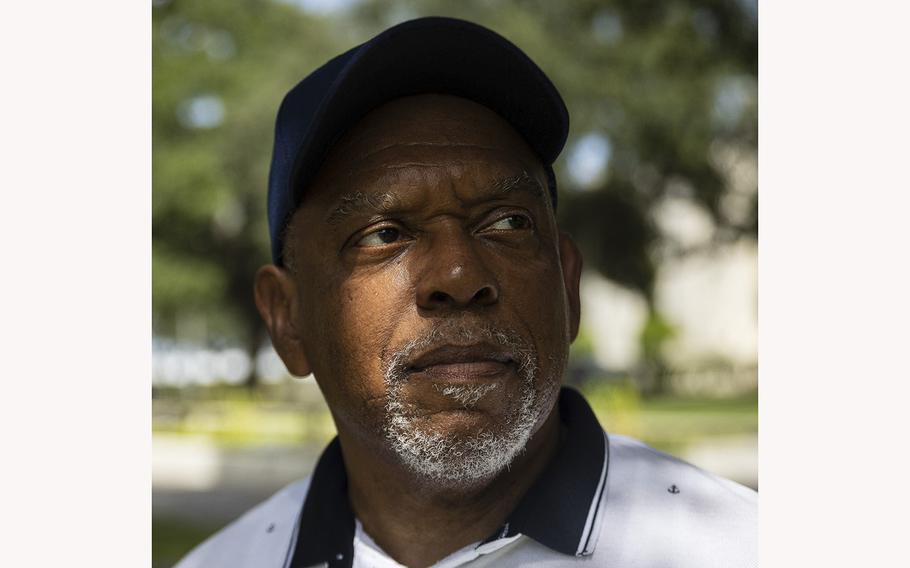
John Beard Jr. founded the Port Arthur Community Action Network in the wake of destruction from Hurricane Harvey. (Tamir Kalifa for The Washington Post )
Meanwhile, Port Arthur residents are seeing some of the harshest climate consequences of burning fossil fuels. With global average temperatures at least 1.1 degree Celsius (2 degrees Fahrenheit) higher than in the preindustrial era, the area faces rising sea levels, brutal heat waves and increasingly disastrous storms.
Hollins's house had to be completely gutted after floodwaters from Harvey devastated the city five years ago. And the storms keep coming: Laura and Delta in 2020, Nicholas in 2021.
He thrust out a clenched fist. "Port Arthur is like this," he said. "And all the problems are like this" - he circled an index finger around his enclosed hand. "We're completely surrounded."
On a recent August afternoon, the air thick with mosquitos and humidity, Kelley led two Washington Post reporters down the concrete walkways of the Prince Hall apartment complex, smiling at residents and fist bumping their kids.
The day before, the House of Representatives passed the sweeping Inflation Reduction Act, dedicating an unprecedented $369 billion to clean energy and other climate priorities. The legislation uses tax credits to bring down the cost of technologies like solar panels, electric vehicles and heat pumps, and establishes a program to curb emissions of methane, a potent greenhouse gas that often leaks from fossil fuel infrastructure. Independent analyses suggest it could curb U.S. greenhouse gas emissions by 40% by the end of the decade, bringing the country closer to what scientists say is needed to avert catastrophic climate change.
It also dedicates tens of billions to address environmental injustice: $3 billion worth of grants to help communities fight pollution and adapt to climate change; $1 billion for energy upgrades in affordable housing; $3 billion to reduce emissions at ports. Roughly 60% of the $27 billion set aside for a national "Green Bank" must be directed toward helping people in disadvantaged areas.
But bundled with these investments was a provision that required the federal government to auction off drilling leases on public lands and waters before it could permit solar and wind projects - tying renewable energy development to fossil fuels.
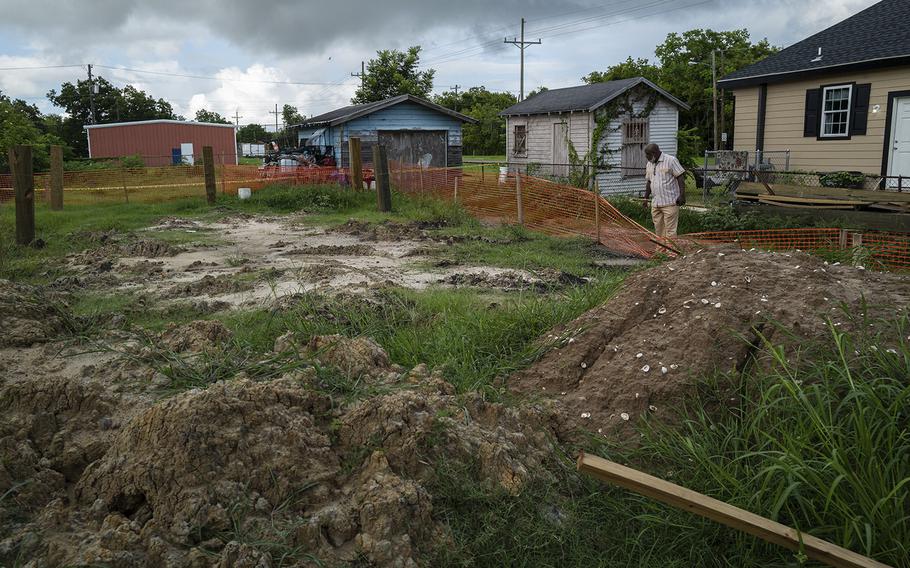
Hilton Kelley, an environmental and community activist, looks at the site where a substance believed to be oil was discovered during construction of a house. (Tamir Kalifa for The Washington Post )
"To me, it's kind of like a double-edged sword," Kelley told Danielle Nelson, a Prince Hall resident. "You know, it's a good deal in some ways. It's pouring money back to our state and eventually to our community. But it's a bad deal they had to give up so much of the regulation that helps protect our health and the environment."
Nelson nodded. "Right, right." Her 11-year-old son Damarion has suffered from lung problems since they moved to Prince Hall three years ago. Some days he complains the air feels like fire, each breath he takes a rattling wheeze.
"If they're sucking up more oil, they're going to be producing more petroleum products, but yet we're the ones that have to breathe the mess," Kelley continued. "Not to mention the potential for spillage in the Gulf."
"Contaminating the water," Nelson chimed in. "Crawfish coming out green."
She remembers when oil from the 2010 Deepwater Horizon spill washed up on local beaches and devastated the fishing industry. In the past year, incident data show, the National Oceanic and Atmospheric Administration has responded to 34 smaller oil and chemical spills in the Gulf of Mexico, including two well malfunctions near Port Arthur that leaked crude oil into a marsh.
Environmental justice and climate activists had fought for an end to federal leasing as a way to start scaling down U.S. production of polluting fuels. They note that the United Nations' Intergovernmental Panel on Climate Change has found the world cannot afford to build new oil wells, gas pipelines and other fossil fuel infrastructure to have a chance of achieving its climate goals.
Under the Inflation Reduction Act, the federal government will be required to auction offshore drilling leases in the Gulf for at least 10 years.
It's impossible to know where companies will choose to drill, what those wells will yield or exactly where the oil will end up going as more leases become available, said Lorne Stockman, research co-director for the environmental advocacy group Oil Change International. But it's reasonable to anticipate that at least some of it will keep Port Arthur's refineries churning.
"These communities have dealt for decades with the incredible power of this industry," Stockman said. "And now, just as they kind of see some light at the end of the tunnel, in terms of a real transition starting to happen, they're concerned that something like this bill could lock them in for decades more."
Activists are more worried, however, about what comes next.
In exchange for Manchin's vote on the new law, Senate Democratic leaders promised to support his proposal to streamline the federal permitting process under the National Environmental Policy Act, the "Magna Carta" of environmental law. Congress is expected to take up that legislation as soon as it returns from August recess.
A draft version of Manchin's proposal obtained by The Post suggests that this permitting "side deal" would cut the time period for public comment on projects from three months to two, tighten deadlines for agency environmental reviews and set a 5-month statute of limitations on lawsuits against potentially problematic permits.
"We are already the area of least resistance," Kelley said, adding that without strong legal protections for public input, "You don't have the money, you don't have the power. Basically, you don't have a voice."
Oil and Gas Watch, an initiative of the Environmental Integrity Project that tracks fossil fuel development, lists at least two proposed projects requiring federal permits in Port Arthur: A new liquefied natural gas terminal and associated compressor stations, and an expansion of an existing LNG terminal that would allow it to export more fuel.
At these facilities, gas is compressed to 1/600th its initial volume and stored in massive tanks before it is shipped overseas. The turbines that drive the compressors generate formaldehyde, benzene and other pollutants, Beard said. The facilities are also at risk of explosions; a rupture at an LNG terminal in Freeport, Texas, in June, sent a massive fireball into the sky and flooded the air with contaminants.
According to Oil and Gas Watch, the two Port Arthur projects have the potential to generate more than 13,000 tons of air pollution and more than 20 million tons of greenhouse gases each year - ultimately contributing to global warming.
Yet if the proposed permitting changes are implemented, it will be harder for residents to participate in public hearings about the projects or sue if they believe an agency's environmental review was incomplete.
"Its already difficult to participate, and if you miss important deadlines, then you often don't have a right to participate going forward," said Ilan Levin, an Austin-based attorney for the Environmental Integrity Project who has worked with several local groups. "Shortening a deadline by 30% would definitely make it impossible for some people to review and comment on projects in their community."
Environmental groups are rallying against the permitting changes, which Manchin and Senate Majority Leader Chuck Schumer, D-N.Y., aim to pass before the end of the fiscal year on Sept. 30. Appalachian activists, concerned about a West Virginia pipeline that would be approved as part of the deal, have planned a demonstration in D.C. next month calling on Democrats to vote against the proposal.
The permitting bill would need at least 10 Republican votes in the Senate to override a filibuster - potentially more if any Democrats refuse to support it.
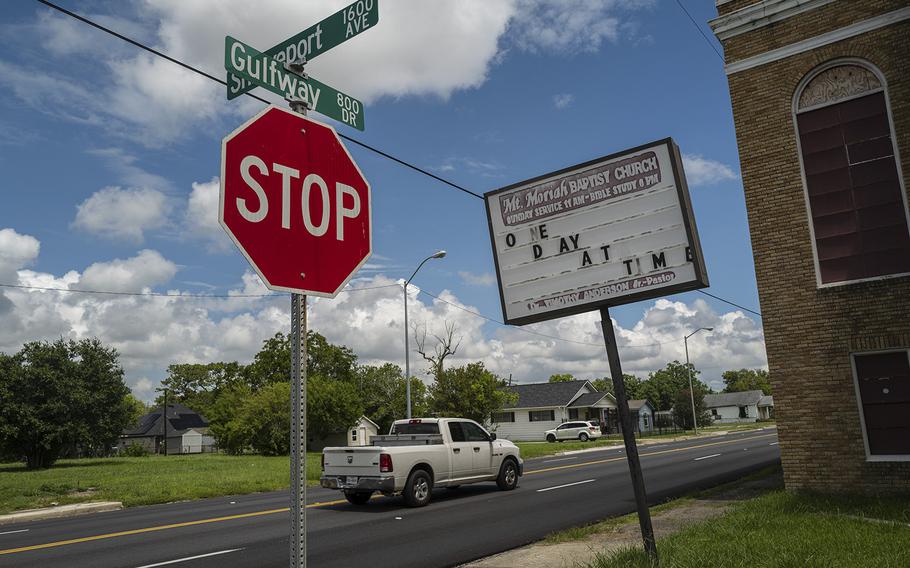
“One day at a time,” with the letter “A” missing, on a marquee outside a church. (Tamir Kalifa for The Washington Post )
Sen. Tom Carper, D-Del., chair of the Senate Environment and Public Works committee, said he expects Manchin and Schumer to reach an agreement that doesn't erode environmental protections. "I'm not interested in permitting reform that makes it worse," he said in an interview. "Having made progress, we don't want to screw it up now."
But activists fear that the changes will be attached to must-pass legislation, such as a continuing resolution to fund the government - making it difficult for progressives to oppose.
Kelley knows what it means to compromise, to accept the change that seems achievable rather than the transformation he truly craves. It's why, in more than 20 years as an activist, he has tried to balance his efforts to curb fossil fuel pollution with the recognition that the industry is too much a part of Port Arthur to be quickly eliminated.
"I get the fact that, you know, they had to give something to get something for that deal," Kelley said. "But at the same time, it's off our backs, and the backs of our children."
Many of the Inflation Reduction Act's most high-profile benefits are out of reach for his neighbors, he said. A tax credit for electric vehicles isn't much help when the median income in Port Arthur is well below the average price of an EV. People who don't own their own homes can't take advantage of incentives for heat pumps and rooftop solar.
Kelley also worries about whether state agencies would take advantage of federal programs to reduce emissions from transportation and housing that could benefit places like Port Arthur. This spring, the Department of Housing and Urban Development found that Texas had discriminated against communities of color in distributing disaster mitigation funding after Hurricane Harvey.
Making the most of the act will require a lot of work from community groups like his, Kelley said - small nonprofits with few support staff often struggle to access federal funds. But ultimately, he said, he aims to embrace the opportunities the law provides: to increase air pollution monitoring and improve public housing, to attract new businesses to Port Arthur's struggling downtown, and to curb demand for the fuels that threaten his neighborhood and the world.
"I would not have wanted to lose out on that," Kelley said. "At the end of the day, I probably would have done the same thing."